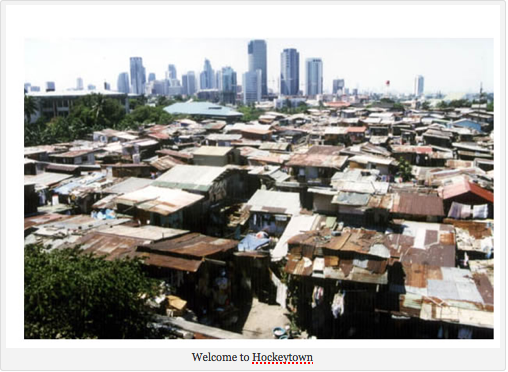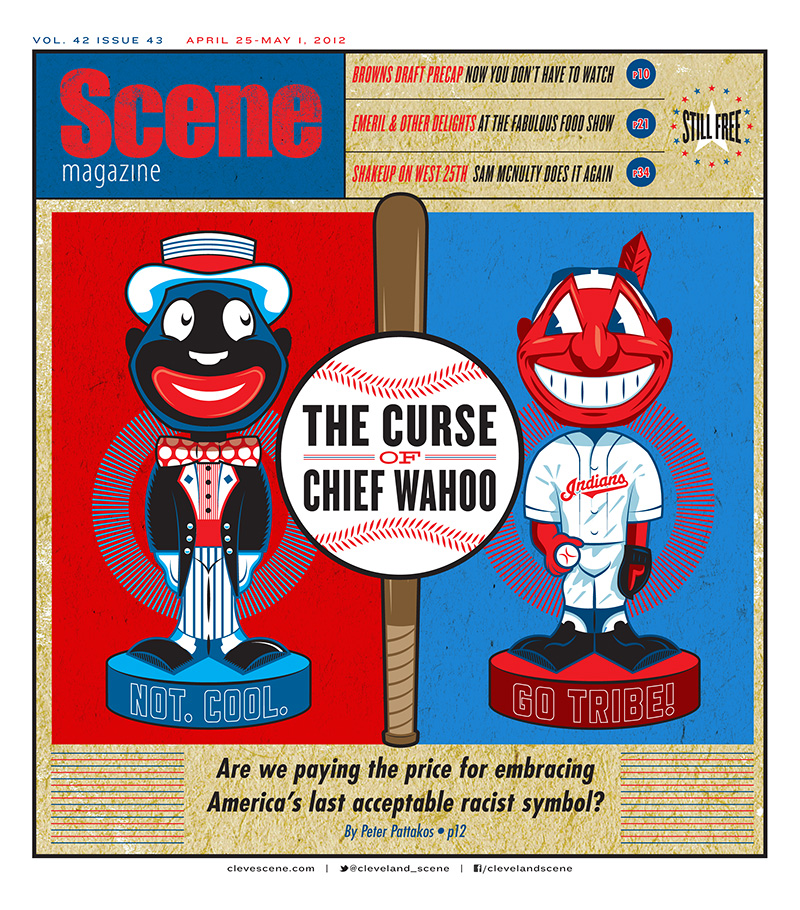“At least we’re not Detroit” might seem like an especially comforting idea these days. Here’s Dave Zirin at The Nation on some “mind boggling headline juxtaposition” from the erstwhile Motor City:
You have, on one day, “Detroit Files Largest Municipal Bankruptcy in History.” Then on the next, you have “Detroit Plans to Pay For New [$650 million] Red Wings Hockey Arena Despite Bankruptcy.” Yes, the very week Michigan Governor Rick Snyder granted a state-appointed emergency manager’s request to declare the Motor City bankrupt, the Tea Party governor gave a big thumbs-up to a plan for a new $650 million Detroit Red Wings hockey arena. Almost half of that $650 million will be paid with public funds.
This is actually happening. City services are being cut to the bone. Fighting fires, emergency medical care and trash collection are now precarious operations. Retired municipal workers will have their $19,000 in annual pensions dramatically slashed. Even the artwork in the city art museum will be sold off piece by piece. . . .
They don’t have money to keep the art on the walls. They do have $283 million to subsidize a new arena for Red Wings owner and founder of America’s worst pizza-pizza chain, Little Caesar’s, Mike Ilitch, whose family is worth $2.7 billion dollars … [thereby] siphon[ing] money out of the city services—things like schools and hospitals—while creating the very kinds of jobs that are the antithesis to those that once built Detroit into the third-largest city in the United States. No living wages. No job security. No tax base. Just spanking new stadiums for suburban sports fans, which Detroit residents will be able to enter only if they’re selling foam novelty fingers. . . .
As legendary Detroit activist Grace Lee Boggs put it, a conservative agenda has “been strip mining cities by privatizing almost all services, attacking public workers and their unions, while at the same time providing billion-dollar tax cuts for large businesses and cutting revenue sharing to the cities.” In a city that’s 83 percent African-American and built on union labor, it’s a pelt long desired by the Snyders of this world. Neoliberalism has destroyed Detroit. Free trade deals have destroyed Detroit. Corporate welfare has destroyed Detroit.
It’s not exactly Dan Gilbert leveraging the popularity of the LeBron-era Cavaliers to buy an election to win a license to trap welfare checks in a city where wealth and income inequality continue to worsen by historical measures. And ground zero of the Haslam family’s public poison for private profits campaign is still a few states away for now. But the priorities that have played to such disastrous effect in Detroit are the same ones that have taken hold in Northeast Ohio and most everywhere else in the U.S. Absent a massive change of course, there’s little to no reason to believe that the rest of the nation won’t end up in Detroit’s place eventually, if by slightly varying routes, if it’s not there already.
Which is why the rest of this post is mostly an excerpt from an excellent book by Professor David Harvey of the City University of New York, titled, “A Brief History of Neoliberalism.”
In this book, Harvey examines the history and impact of the ideology that’s come to be known as “neoliberalism,” which holds, at least in practice, that humanity has “no alternative except to live under a regime of endless capital accumulation and economic growth no matter what the social, ecological, or political consequences.” Much of Harvey’s book, including the excerpt below, speaks specifically to “the practice of prioritizing the needs of banks and financial institutions” at the expense of the well-being of populations at large, a function of neoliberalism that’s been systematically implemented for most of the last 40 years by the world’s dominant nations. While published in 2007, this excerpt specifically anticipates Detroit’s present and future, and explains that the conditions that gave rise to the nation’s current mess of runaway inequality and social and ecological decay have been the natural consequences of a plan set into motion in the 1970s that crystallized in significant part with New York City’s fiscal crisis of that decade.
Before this section on the New York crisis, Harvey first discusses a confidential memorandum to the U.S. Chamber of Commerce dated August 23, 1971, written by soon-to-be-confirmed Nixon appointee to the Supreme Court, Lewis Powell. In this memorandum, Powell urges U.S. business leaders to mount an attack against opponents of the nation’s “free enterprise system,” and explains that, “[s]trength lies in organization, in careful long-range planning and implementation, in consistency of action over an indefinite period of years, in the scale of financing available only through joint effort, and in the political power available only through united action and national organizations.”
From his discussion of Powell’s memo and its exponential impact on the Chamber of Commerce’s campaign chest, Professor Harvey proceeds to discuss the “iconic case” of the New York City fiscal crisis of the 1970’s:
The New York City fiscal crisis was an iconic case. Capitalist restructuring and deindustrialization had for several years been eroding the economic base of the city, and rapid suburbanization had left much of the central city impoverished. The result was explosive social unrest on the part of marginalized populations during the 1960s, defining what came to be known as ‘the urban crisis’ (similar problems emerged in many US cities). The expansion of public employment and public provision – facilitated in part by generous federal funding – was seen as the solution. But, faced with fiscal difficulties, President Nixon simply declared the urban crisis over in the early 1970s. While this was news to many city dwellers, it signaled diminished federal aid. As the recession gathered pace, the gap between revenues and outlays in the New York City budget (already large because of profligate borrowing over many years) increased.
At first financial institutions were prepared to bridge the gap, but in 1975 a powerful cabal of investment bankers (led by Walter Wriston of Citibank) refused to roll over the debt and pushed the city into technical bankruptcy. The bail-out that followed entailed the construction of new institutions that took over the management of the city budget. They had first claim on city tax revenues in order to first pay off bondholders: whatever was left went for essential services. The effect was to curb the aspirations of the city’s powerful municipal unions, to implement wage freezes and cutbacks in public employment and social provision (education, public health, transport services), and to impose user fees (tuition was introduced into the CUNY university system for the first time). The final indignity was the requirement that municipal unions should invest their pension funds in city bonds. Unions then either moderated their demands or faced the prospect of losing their pension funds through city bankruptcy.
This amounted to a coup by the financial institutions against the democratically elected government of New York City, and it was every bit as effective as the military coup that had earlier occurred in Chile. Wealth was redistributed to the upper classes in the midst of a fiscal crisis. The New York crisis was, [Robert] Zevin argues, symptomatic of ‘an emerging strategy of disinflation coupled with a regressive redistribution of income, wealth and power’. It was ‘an early perhaps decisive battle in a new war’, the purpose of which was ‘to show others that what is happening to New York could in and some cases will happen to them’.
Whether everyone involved in negotiating this fiscal compromise understood it as a strategy to restore class power is an open question. . . . [b]ut [it] was certainly what investment bankers like Walter Wriston had in mind. He had, after all, equated all forms of government intervention in the US and Britain with communism. And it was almost certainly the aim of [then-President] Ford’s Secretary of the Treasury William Simon (later to come head of the ultra-conservative Olin Foundation). Watching the progress of events in Chile with approval, he strongly advised President Ford to refuse aid to the city (‘Ford to City: Drop Dead’ ran the headline in the New York Daily News). The terms of any bail-out, he said, should be ‘so punitive, the overall experience so painful, that no city, no political subdivision would ever be tempted to go down the same road’.
While resistance to the austerity measures was widespread, it could only, according to [Joshua] Freeman, slow ‘the counterrevolution from above, it could not stop it. Within a few years, many of the historic achievements of working class New York were undone’. Much of the social infrastructure of the city was diminished and the physical infrastructure (for example the subway system) deteriorated markedly for lack of investment or even maintenance. Daily life in New York ‘became grueling and the civic atmosphere turned mean’. The city government, the municipal labour movement, and working-class New Yorkers were effectively stripped ‘of much of the power they had accumulated over the previous three decades’. Demoralized, working-class New Yorkers reluctantly assented to the new realities.
But the New York investment bankers did not walk away from the city. They seized the opportunity to restructure it in ways that suited their agenda. The creation of a ‘good business climate’ was a priority. This meant using public resources to build appropriate infrastructures for business (particularly in telecommunications) coupled with subsidies and tax incentives for capitalist enterprises. Corporate welfare substituted for people welfare. . . . . [T]he investment bankers reconstructed the city economy around financial activities, ancillary services such as legal services and the media (much revived by the financialization then occurring), and diversified consumerism (with gentrification and neighborhood ‘restoration’ playing a prominent and profitable role). City government was more and more construed as entrepreneurial rather than a social democratic or even managerial entity. Inter-urban competition for investment capital transformed government into urban governance through public-private partnerships. City business was increasingly conducted behind closed doors, and the democratic and representational content of local governance diminished.
Working-class and ethnic-immigrant New York was thrust back into the shadows, to be ravaged by racism and a crack cocaine epidemic of epic proportions in the 1980s that left many young people either dead, incarcerated, or homeless, only to be bludgeoned again by the AIDS epidemic that carried over into the the 1990s. Redistribution through criminal violence became one of the few serious options for the poor, and the authorities responded by criminalizing whole communities of impoverished and marginalized populations. . . . [Mayor] Giuliani was to claim fame by taking revenge on behalf of an increasingly affluent Manhattan bourgeoisie tired of having to confront the effects of such devastation on their own doorsteps.
The management of the New York fiscal crisis pioneered the way for neoliberal practices both domestically under Reagan and internationally through the IMF in the 1980s. It established the principle that in the event of a conflict between the integrity of financial institutions and bondholders’ returns, on the one hand, and the well-being of the citizens on the other, the former was to be privileged. It emphasized that the role of government was to create a good business climate rather than look to the needs and well-being of the population at large.
From there, it wasn’t long before the business class had organized to “capture the Republican Party as [its] own instrument” to destroy consumer protection and labour laws, deregulate industry, agriculture, and resource extraction at all levels, and rewrite the tax code (including by slashing the marginal tax rate on the nation’s highest earners (35%) to more than half of what it was for most of the century (70-90+%)), all while steadily replacing the vote with the dollar as the fundamental unit of democracy. And here we are in 2013, with redistribution of wealth to the upper class in the midst of fiscal crises just another day at the office, income distribution in New York “on par with countries like Sierra Leone, Namibia, and Lesotho,” and the rest of the U.S. well on its way. With a “good business climate” that provides for bankruptcy laws that allow governments to forfeit their pension obligations and build $600 million hockey stadiums at the same time, and plenty of available houses to stack the bodies in.
In other news, Cleveland’s only daily newspaper, the Plain Dealer, terminated one-third of its editorial staff yesterday, “about fifty experienced journalists,” because when the advertisers buy the government they don’t leave a whole lot for the media to mediate. But if the season ended today, the Indians would be in the playoffs. Burn in hell forever, Ariel Castro. Ki Yi Waugh Woop.
—————
UPDATE: Dan Gilbert would like to get on with the suspension of democracy already




